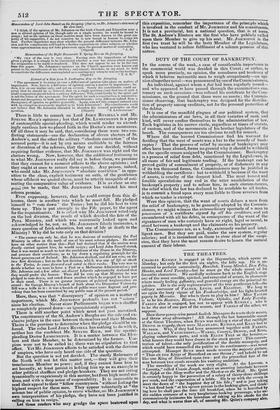DUTY OF THE COURT OF BANKRUPTCY.
IN the course of the week, a case of considerable importance to the commercial world was decided in this Court; or rather, to speak more precisely, an opinion, the soundness and tendency of
winch it behoves mercantile men to weigh scrupulously—an opi- nion altogether novel—was pronounced by one of the Commissioners, An individual, against whom a fiat had been regularly issued— and who appeared to have passed through the examinations cus-
tomary on such occasions—was refused his certificate by the Com- missioner, on the ground that there were no assets ; the Commis- sioner observing, that bankruptcy was designed for the distribu- tion of property among creditors, not for the personal protection of the debtor.
It is one of the manifold plagues of our political system, that the administrators of our laws, in all their varieties of rank and kind, will never confine themselves to the administration of law. Each legislates in his narrow circle, regardless at times of statute, of custom, and of the movements of his brother legislators of the bench. The consequences are too obvious to call for remark. Where did the learned Commissioner find his warrant for deciding that the want of assets was a bar to the remedy of bank- ruptcy? That the process of relief by means of bankruptcy may often have been abused, forms no ground why it should be withheld on the specific reason assigned by the Commissioner. Bankruptcy is a process of relief from debt, sanctioned by the Legislature, in all cases of fair and legitimate trading. If the bankrupt can be proved guilty of concealment of property, or of dishonesty in any of its ten thousand forms, the Commissioners may be justified in withholding the certificate : but to withhold it because of the want of assets, is cruelty of the deepest kind. The most honest and feasible speculations may end in the utter annihilation of the bankrupt's property; and to refuse him, in such circumstances, the relief which the law has declared to be available to all trades, is to commit a fraud upon every man liable to those reverses from which no trader is exempt.
Were this opinion, that the want of assets debars a man from the relief of bankruptcy, to be generally adopted by the Commis- sioners, we might witness the extraordinary spectacle of a man in possession of a certificate signed by all his creditors, and yet encumbered with all his debts, in consequence of the want of the signatures of men who certainly have no right, legal or moral, to stand between a bankrupt and the claimants on his property. The Commissioners are, as a body, extremely useful and Intel- ligent men. But they are paid, under the new system, regular
salaries; and it is incumbent on them to steer clear of the suspi- cion, that they have the most remote desire to lessen the natural amount of their labour.


























 Previous page
Previous page